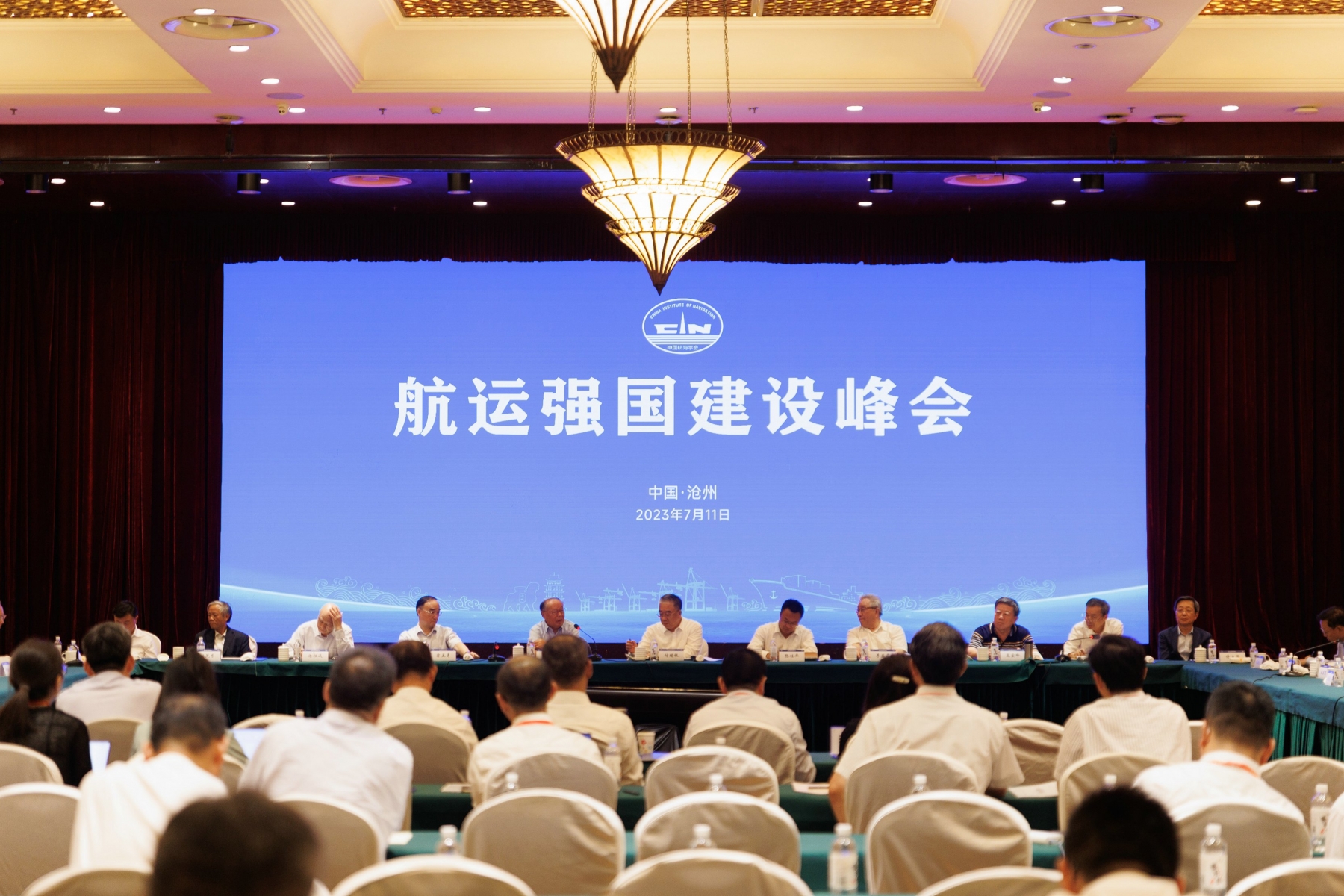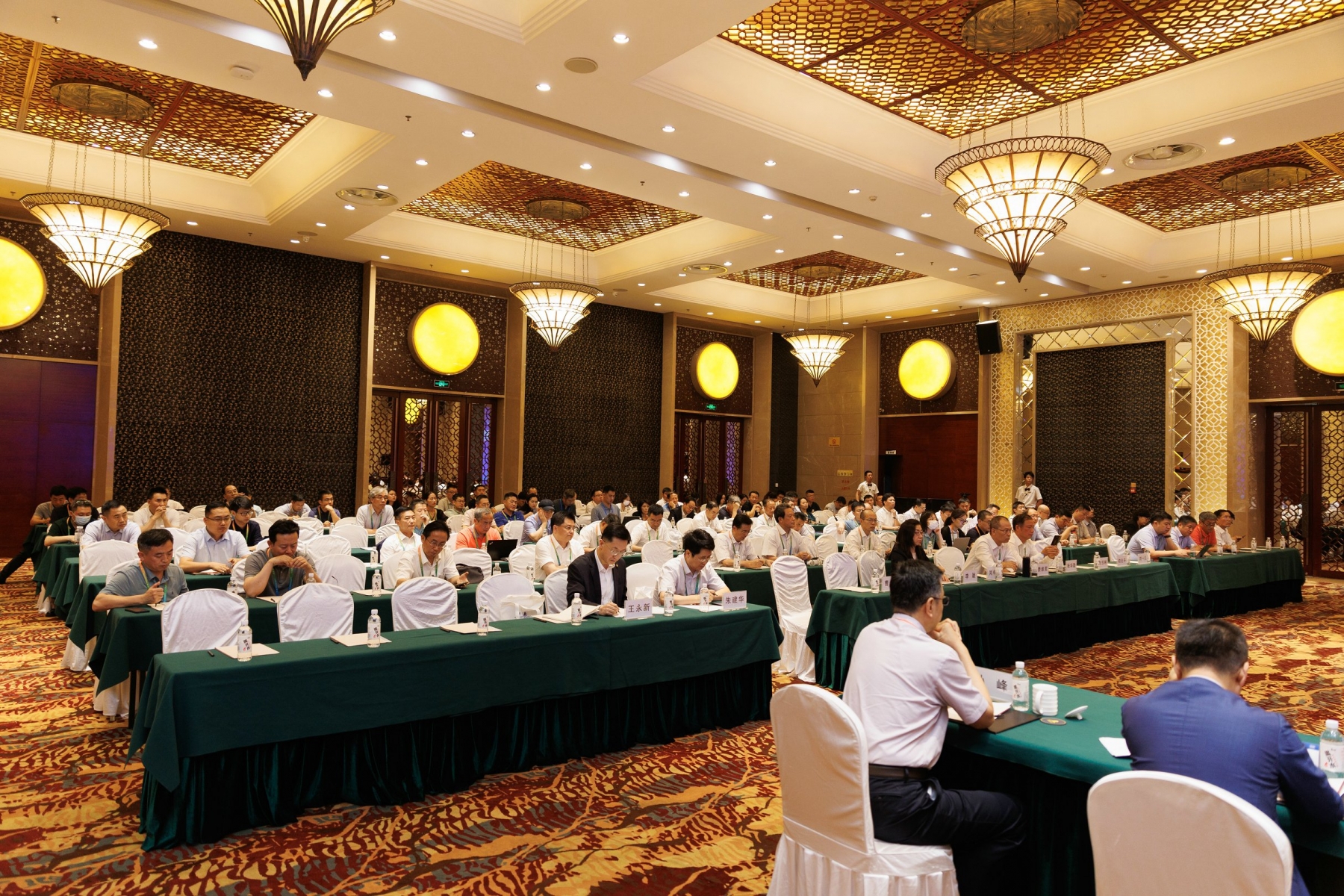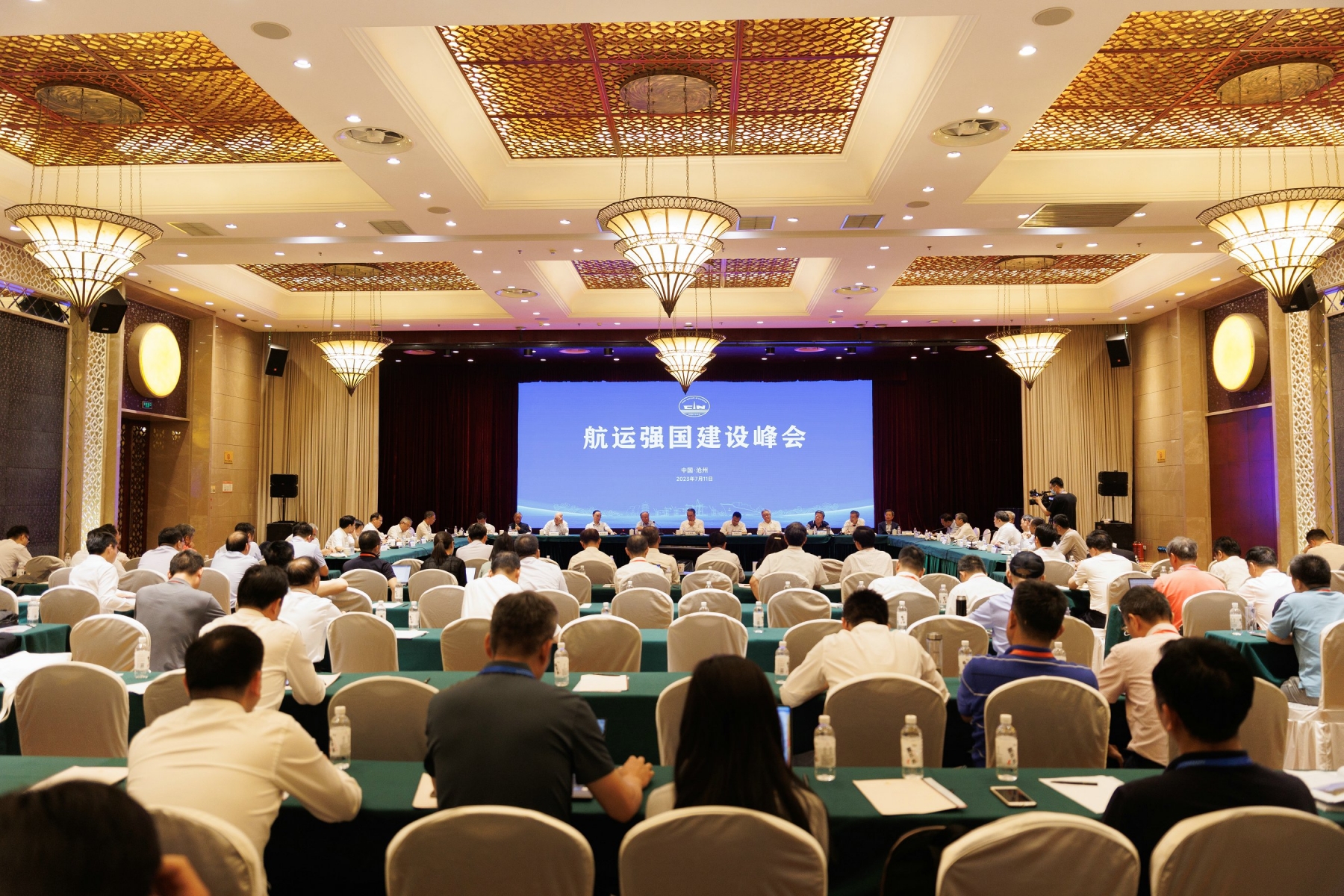Adhering to green, low-carbon and intelligent innovation, promoting high-quality development of the shipping industry, and enhance the implementation of a high-level maritime technology self-reliance and self-improvement coordination mechanism.
On the afternoon of July 11, the Navigational China Summit was held in Cangzhou, Hebei Province, during the China Maritime Week 2023. Fu Xuyin, Vice Minister of the Ministry of Transport (MOT), attended the meeting and delivered a speech, while He Jianzhong,president of China Institute of Navigation (CIN), presided over the meeting. Huang Zhendong, Former Minister of MOT, Li Shenglin, Former Minister of MOT, Weng Mengyong, Former Vice-Minister of MOT and Chairman of the China Highway And Transportation Society (CHTS), Gao Hongfeng, Former Vice-Minister of MOT and Chairman of the China Express Association (CEA), Xu Zuyuan, Former Vice-Minister of MOT and Goodwill Ambassador of the International Maritime Organization (IMO), Ren Maodong, Executive Deputy Director of China National Committee for the Wellbeing of the Next Generation (CNCWNG), Xu Lirong, former Chairman of COSCO Shipping Group, and academicians of the Chinese Academy of Engineering (CAE), Zhang Jianyun, Yan Xinping, and Hu Ya'an, attended the meeting and participated in the seminar. Delegates from relevant large-scale enterprises, associations, research institutes, branches of Nautical Society, local nautical societies and some special researchers from China Nautical Think Tank attended the meeting.
Enhance the sense of mission and strengthen the shipping industry
Fu Xuyin stressed that under the overall deployment and leadership of the Guidelines on the Construction of A Country with Strong Transportation network and the Guidelines on Developing Comprehensive Transport Network, in the construction of a safe, convenient, efficient, green and economic modern comprehensive transportation system, we should grasp the relationship between a strong shipping country and the regional economic development, and to make the shipping industry stronger in six aspects: strong infrastructure, strong innovation capability, strong industry governance, strong service guarantee, strong green transformation, and safe development, and to strive to achieve the first-class facilities, first-class technology, first-class management, first-class service, and to play its due role in building a strong transportation country which can satisfy people, provide strong guarantee and leads in the world.
He Jianzhong stressed that, first, we should further improve the understanding of the construction of a strong shipping nation and enhance the sense of mission, responsibility and urgency. Second, to further improve the mechanism, CIN will lead the industry's large enterprises, scientific research institutions, related associations to jointly sign to establish a collaborative mechanism to promote high-level maritime science and technology self-reliance and self-improvement synergistic mechanism, and form a multi-party integration exchange platform which gathers talents, wisdom, academic policy sources, innovation confidence, exchange and mutual learning, and cohesion, so as to effectively serve the implementation of national strategy and transportation to become a pioneer of Chinese modernization. Third, it is necessary to further highlight the theme, strengthen research on major scientific issues, engineering and technical problems and industrial development problems in the construction of shipping power, such as strengthening the research and standardization of port automation technical standards, in order to reduce the cost of technology application and improve the competitiveness of China's ports. Fourth, we should further promote the achievements of innovation, formulate an action plan for the application of intelligent shipping technology, do a good job of supporting the test site, laws and regulations, and safeguard measures, eliminate the constraints of the development of intelligent shipping to promote the upgrading of the digital transformation of navigation; Fifth, we need to give play to the main role of enterprises and promote the development of industrial and innovation chains.
Strengthen the top-level design and make a good combination of punches
Veteran leaders from the MOT, who attended the summit, put forward suggestions and solutions to the shortcomings in the construction of a strong shipping nation.
Huang Zhendong said that to strengthen the construction of shipping power we should speed up the implementation of several landmark projects and short-board projects of Chinese modernization; We should improve the service level of competent industry departments and improve the development of the real economy; We should carefully listen to the opinions and suggestions of industrial enterprises, solve the difficulties and pain points, and help enterprises become bigger and stronger.
Li Shenglin proposed that further attention should be paid to the digital transformation of shipping. Intelligent shipping cannot be separated from the digital transformation of shipping. He suggested that the CIN should do further research and make suggestions to government departments to strengthen the top-level design, and form a perfect mechanism for promoting digitalization standards. He also suggested attaching great importance to the inheritance and development of China's ancient water transportation civilization, so as to promote the high-quality development of transportation and become an important source of strength for the construction of a shipping power.
Weng Mengyong said that the development of new energy ships need to speed up the introduction of supporting standards and norms, strengthen industry supervision, and eliminate potential risks. In the way of energy use of new energy ships, the construction of a variety of energy supply systems is currently being promoted and there are also a number of post-completion operational difficulties and other issues in practice. He recommended that the main focus should be on pure electric power. In particular, key national laboratories should assume the responsibility of accelerating the application technology research of vessels powered by new energy under the guidance of competent departments of the industry.
Gao Hongfeng proposed that the development of the cruise industry is China's short board in the field of shipping. Although China's cruise industry has developed rapidly in recent years, the gap is still large. He recommended to strengthen the top-level design, avoid the duplication of construction of cruise ship homeport and other facilities, and increase the cultivation of cruise industry talents.
Xu Zuyuan said that the construction of a shipping power should be a combination of mechanisms. We should focus on development goals, find breakthroughs, and strive to form an international and domestic "chorus" of shipping power construction.

Aiming at Green, Low Carbon and Intelligent to form the "Chinese Standard"
Participating experts and scholars spoke freely, focusing on the new trend of green, low-carbon and intelligent shipping development. Academician Yan Xinping pointed out that the current development of China's inland navigation lags behind highways and railroads, and is an area in urgent need of development for the Yangtze River Economic Belt, ecological development and dual circulation economic development. The main shortcomings are reflected in the slow development of intelligent and green inland ships; weak conditions of new infrastructure for waterway facilities; low efficiency and effectiveness of transport organization and services; and insufficient investment in scientific research and innovation. He suggested that the technical needs of the new generation of shipping system should be led by promoting the research and development of key technologies and equipment, realizing the demonstration application of a number of green and intelligent internal shipping equipment and systems in typical scenarios, and realizing the transportation mode of the new generation of inland shipping system marked by "shore-based transportation control and supplemented by ship terminal duty". We need to further implement last year's China's inland waterway green intelligent ship development guidance issued by five ministries and commission (Ministry of Education, Ministry of Natural Resources, Ministry of Ecological Environment, Ministry of Agriculture and Rural Affairs, Ministry of Culture and Tourism), form a working mechanism of "central-local linkage and inter-ministerial cooperation", clarify the development path, overall planning and step-by-step implementation, and lead the high-quality development of inland waterways shipping. Academician Hu Ya'an suggested that we should attach great importance to the operation and supervision of new energy ships. He believes that the current new energy ship design standards and specifications are not matching, and the design techniques are still immature. Government departments should make overall planning and guidance.
Mr. Gu Jinshan, Secretary of the Party Committee and Chairman of SIPG, said that green and smart is the development direction of today's port and navigation. China's smart port construction has made great achievements, forming a number of smart green ports with international leading level. China Ports and Harbors Association (CPHA) will be committed to continuously improve the level of green and smart ports in China: encouraging and guiding major ports and related units to build a research platform for smart and green ports, and solving the difficulties of green and smart development of China's ports; actively advising the government to increase the policy support for green development of ports and harbors and navigations in terms of funding, taxation, etc., and rationally planning the layout of green energy refilling in China's ports; forming a global green port construction "China Program" and "China Standard", and strengthen the exchange and cooperation between China and other national standards.
Xu Guoyi, former director of the Office of the Shanghai Shipping Exchange Committee, proposed that to build a shipping power, first, we must strengthen the top-level design, build a cooperation platform as a whole, and form a joint force. Second, it is necessary to strengthen the training of relevant talents in shipping countries, including high-quality crew teams, scientific research teams, management teams and inspection teams. The third is to form the culture of a shipping power, wake up the blue gene, and form a cultural atmosphere suitable for the construction of a shipping power.
Song Chunfeng, General Manager of China Shipowners Mutual Assurance Association, proposed that in order to better serve the construction of a strong shipping nation, the Association will support the Poseidon Principles for Marine Insurance and actively underwrite new energy ships; support digital development, support and promote blockchain bills of lading, and underwrite shipping P&I network risks; attach importance to the Association's own digital development, empower the Association's loss prevention capacity and level, and escort China's intelligent and green development of shipping.
Accelerating the Development of Intelligent Shipping, Deep Integration of Industry, Academia, Research and Utilization
Zhang Baochen, Executive Vice President of CIN, made a keynote speech on accelerating the R&D and application of intelligent shipping technology, and building the foundation for the construction of a strong shipping nation. He said that China has been in the forefront of the world in the top-level design research of intelligent shipping system, but there are still problems such as the combination of research and development and industrial development goals is not tight, the lack of effective planning, and the lack of understanding of the transformative technical characteristics of intelligent navigation. He suggested that on the basis of the guidance on the development of intelligent shipping, specific plan should be made to implement the"15th Five-Year Plan" and "16th Five-Year Plan" for developing intelligent shipping for the government, the industry, businesses from a variety of perspectives. In addition, we also need to pay attention to the construction of intelligent shipping technology research and development application ecosystem, and start the construction of intelligent navigation scientific experiment facilities.
Liu Shubin, President of the Institute of Water Transportation Science of the MOT, proposed in his keynote speech that China's ports have made new breakthroughs in green and low-carbon development, but they are still insufficient in terms of regional and policy system coordination, the main role of green and low-carbon energy supply is not enough, the technological path and innovation system need to be improved, and the leading role of green and low-carbon development in the industry is not outstanding. He suggested: further promoting the green and low-carbon synergistic development of regional port clusters; promoting the green and low-carbon synergistic development of the whole supply chain with ports as the key hub; promoting the synergistic development of pollution reduction and carbon reduction with a clean and low-carbon port energy system as the core; and promoting the international and domestic synergistic development of green and low-carbon technologies and standards for ports.
In his keynote speech, Sun Yuqing, president of Dalian Maritime University, pointed out that China's low-carbon ship development generally has problems such as insufficient capacity of ship emission reduction technology innovation and research and development, supply and demand deadlock of alternative fuels that still need policy intervention, and shipping carbon tax response solutions that need to be strengthened. He suggested strengthening top-level design at the national level and leading the transformation and development of ship equipment manufacturing industry through downstream demand; Increase the research and development of green and low-carbon technologies for ships, and set up a special financial fund to support and guarantee the promotion of carbon peak research and development, piloting, demonstration and popularization; carry out tracking research on the legislative process and system content of the EU shipping carbon tax, and assess the impact on China's shipping and trade; and pay attention to the cultivation of qualified talents to achieve the in-depth integration of industry, academia, research and application.


